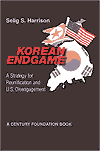Reviews
of Selig Harrison's 2002 Book
Korean Endgame:
A Strategy for Reunification and U.S. Disengagement
 Don
Oberdorfer, author of The Two Koreas: A Contemporary History,
former diplomatic correspondent for the Washington Post: Don
Oberdorfer, author of The Two Koreas: A Contemporary History,
former diplomatic correspondent for the Washington Post:
"Selig Harrison has longer and more intimate experience with
North Korean security issues than any other American observer.
He has used his inside knowledge plus extensive additional
research to produce a provocative appeal for new thinking
about the current situation on the Korean peninsula and
the challenges in the years ahead. This is an important
contribution that will benefit policymakers and the public
alike."
Jimmy
Carter, 39th President of the United States, Founder and
Chairman of The Carter Center:
"Korean Endgame is the best analysis I have seen of
the difficult policy choices facing the United States in
Korea. Selig Harrison covers all the key issues accurately
and thoroughly, bringing into perspective the complicated
relationships among North Korea, South Korea, and the United
States. Providing a realistic strategy for ending one of
the world's most dangerous military confrontations, this
book should be required reading for policymakers and others
who care about Asia and international affairs."
 Book
Review by Lucian W. Pye for Foreign Affairs: Book
Review by Lucian W. Pye for Foreign Affairs:
At
a time when North Korean nuclear developments have created
a crisis in world affairs, we are fortunate to have this
thoughtful and provocative book. Based on meetings with
both Kim Il Sung and his son, Kim Jong Il, Harrison presents
explanations of Pyongyang's actions that are more sympathetic
and intelligent than the official pronouncements of the
North Korean government. He sees reunification as a realistic
goal through a confederation of North and South, with all
surrounding powers pledging the neutralization and denuclearization
of the peninsula. He argues that the United States should
withdraw its forces from South Korea over a ten-year period
and seek to be an honest broker between North and South.
With the end of the Cold War, North Korea lost the security
backing of both Russia and China, and thus, in Harrison's
view, it feels vulnerable to American attack, justifying
the restart of its uranium-enrichment program. Although
Harrison does not prepare us for the severity of the tensions
caused by North Korean actions, he does cover a wide range
of issues and much inside history, making this read still
valuable.
As
printed in Foreign Affairs (May/June 2003)
Korean
Endgame: A Strategy for Reunification and U.S. Disengagement.
Selig S. Harrison. Princeton: Princeton University Press,
2002, 352 pp. $29.95
|
|

